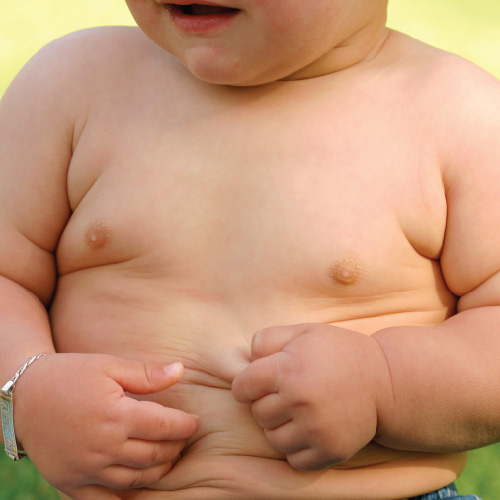Newborn and infant obesity

>I recently heard a mother chatting away to another about how she wasn’t looking forward to her infant (aged around 7-8 months) losing all of her ‘baby fat’. I took a quick glimpse at her child who was sitting in the pram and was greatly saddened to see that her baby could hardly move from the rolls on her wrist and thighs, yet her mother, like many, thought this was 'cute' and part of being a baby. Alas, this is an all too common theme for our baby’s and infants. Especially with those that I see coming through my clinic with symptoms of Digestive Overload (often called colic and reflux) because overfeeding is one of the biggest causes of this.
Unfortunately for our young, Western society is conditioned to believe that a big baby is a ‘cute baby.’ However, hanging cheeks, rolls on the arms, wrists and legs is not cute. It is symptomatic of an unhealthy trend of obesity for our newborns and infants from an overabundance of fat moving onto their bodies, leaving organs to struggle.
Some health organisations do not consider large weight gains to be an issue. In fact they give the baby and parents a big tick that all is well when rapid, large gains occur, even though it’s highly likely that that baby only sleeps for short cycles during the day, followed by longer sleeps at night, with this happening because they are overfeed, not burped enough and eventually sleep out of exhaustion at night. I call this cycle of events the 'Common Cycle of Digestive Overload.'
So what is considered a large weight gain?
To answer this it’s best to start with the question, what is a healthy weight gain? A standard guide, according to Maria Pollard, whom is the Associate Director of Nursing, Midwifery and Health Professions for Scotland working with the NHS, is 20grams a day (7ozs a day)1 from the age of newborn to around three months. After this, a baby’s increase in weight naturally slows down, yet for many newborns this natural occurrence isn’t seen because overfeeding is happening. The World Health Organisations guidelines are 141-198grams per seven days (5-7ozs).
Causes of overfeeding
While gene’s obviously play a part in one’s possibility of obesity a study by Harvard University says, ‘Early-life influences, beginning with the intrauterine environment and continuing through the first few years of life, also shape the trajectory of weight gain and body fatness throughout the life course.’2 The researchers state that there are ‘Three modifiable postnatal factors during infancy that influence weight in later life include
- how rapidly an infant gains weight,
- the initiation and duration of breastfeeding, although this is a controversial area of research.
- how much an infant sleeps.
Through my clinical research I would like to add two more contenders…
- overfeeding – feeding newborns beyond their physiological capacities and capabilities whether breast or formula fed
- cluster feeding – a largely advocated method of breast feeding that sees baby feeding every hour to two, three hours despite the fact that this places their digestive organs under pressure in many ways, because it works against their basic digestive biology.
As mothers, many of us know that when you have a crying baby that is rooting to suck the easiest thing to do to bring momentary calm and relief is to feed, whether this is a brief feed, or keeping them latched on the breast for long periods. And because we are all largely taught that when a baby roots to suck they are hungry, then of course you are going to follow this advice and feed – why wouldn’t you when your health professional tells you this is the case. We all want to do the best for our newborns right and they are meant to know. Well new clinical research now points toward the fact that newborns look to suck for three reasons:
- hunger
- comfort
- saliva enzymes – instinctively or not
So how do you know the difference between each of these?
By understanding your baby’s digestive biology which show us it takes longer than three hours for nutrients to be broken down in the stomach and unlike adults, a newborns food is pushed onward in the digestive tract by the amount of food they are receiving. So when we feed in quick succession (before 3 ½ hourly) these natural processes are jeopardised and the food then gets pushed out of the stomach before it has had a chance to be broken down appropriately, placing other organs under pressure to preform abnormally. This creates unsettled behaviour, short sleep cycles and discomfort, which of course then has a baby looking to suck more for comfort, sometimes furiously searching. This is all too often read as a hunger cue, which then brings about the common cycle of Digestive Overload and one of the causes of this, overfeeding.
Studies
According to a published study in the National Center for Biotechnology Information, there is a worldwide prevalence of obesity in pre-school children and this had increased from approximately 4% in 1990 to 7% in 2010.3
Excessive weight gain and obesity in early childhood has been linked to chronic health conditions such as diabetes mellitus, cardiovascular disease4,5 and obesity in adulthood.6,7 In infancy, excessive weight gain and growth chart percentile crossing has been associated with obesity in later life.8,9
The lead author of a new study undertaken by the Department of Ambulatory Care and Prevention at Harvard Medical School and Harvard Pilgrim Health Care, as well as Children's Hospital Boston states, "There is increasing evidence that rapid changes in weight during infancy increase children's risk of later obesity. The mounting evidence suggests that infancy may be a critical period during which to prevent childhood obesity and its related consequences." The study has found that rapid weight gain during the first six months of life may place a child at risk for obesity by the age of three. The study goes onto say that ‘The connection between rapid infant weight gain and later obesity was striking, even after adjusting for factors such as premature babies or those underweight at birth. Take for example two infants with the same birth weight who, after six months, weigh 7.7 kg (16.9 pounds) and 8.4 kg (18.4 pounds), a 0.7 kg (1.5 pounds) difference. According to study estimates, the heavier of these two infants would have a 40% higher risk of obesity at age 3 (after adjusting for potential confounders).’10
Researchers at Brigham young University analysed data from 8,000 families and found that newborns that are predominantly fed formula were 2.5 times more likely to become obese toddlers than babies that had been breastfed for the first six months.11 I believe part of the reason for this is that the majority of formula cans suggest parents feed their baby quantities that are well beyond their natural stomach capacity at certain ages. For example, most cans say 250mls by 6 months of age when biology tells us a one year old stomach can only hold 150mls during one feed – this kind of overfeeding contributes to ‘reflux’ diagnosis because the overabundant quantity has nowhere to go but up.
What you can do to avoid newborn and infant obesity
- Gain healthy weight during pregnancy – studies have shown that excessive maternal weight is a factor for infant obesity12
- Feed to the capacity and capabilities of your child’s biological digestive function
- Breastfeed and formula feed to the size of bubs stomach. With breastfeeding most newborns receive what they need at around 20 minutes to keep them satisfied for 3 ½ to four hours. However, this is dependent on the individual newborns capacity to suck well and without symptoms that can compromise feeding e.g. tongue and lip tie.
- Instead of feeding between the appropriate time for your babies digestive process learn how to burp them well – I teach a step-by-step way to do this called Nature’s Wind Sequence
- Learn your baby’s correct cues – something I also teach throughout my book, consultations and workshops
- Avoid introducing solids to early – a Harvard University and Children’s Hospital Boston study shows that a baby’s increase in obesity by the age of three increases six-fold when fed solids before this age.13 The World Health Organisation recommends six months, as do I.
- Encourage activity
- Evidence based care for Breastfeeding Mothers: A resource for midwives and Allied Healthcare Professionals, Maria Pollard
- https://www.hsph.harvard.edu/obesity-prevention-source/obesity-causes/prenatal-postnatal-obesity/
- https://www.ncbi.nlm.nih.gov/pmc/articles/PMC4561623/
- https://www.ncbi.nlm.nih.gov/pubmed/15145640
- https://www.ncbi.nlm.nih.gov/pubmed/24080793
- https://www.ncbi.nlm.nih.gov/pubmed/18541567
- https://www.ncbi.nlm.nih.gov/pubmed/23167588
- https://www.ncbi.nlm.nih.gov/pubmed/15213049
- https://www.ncbi.nlm.nih.gov/pubmed/22907690
- https://hms.harvard.edu/news/infant-weight-gain-linked-childhood-obesity-3-30-09
- http://pediatrics.aappublications.org/content/123/4/1177
- http://www.todaysdietitian.com/newarchives/011211p26.shtml
- https://hms.harvard.edu/news/infant-weight-gain-linked-childhood-obesity-3-30-09


